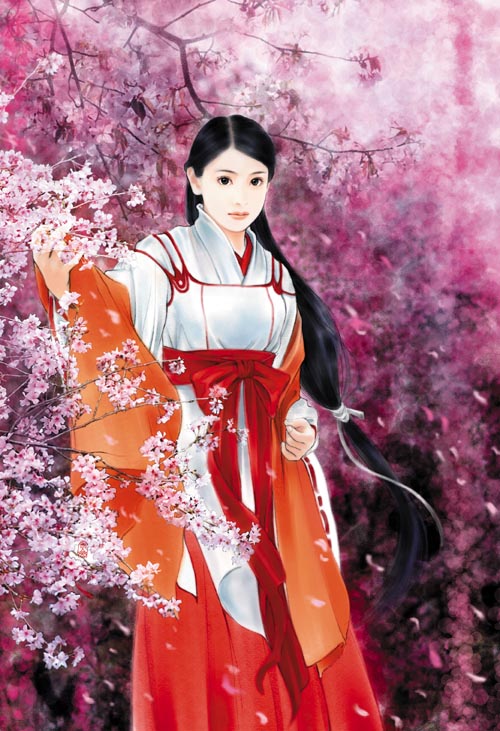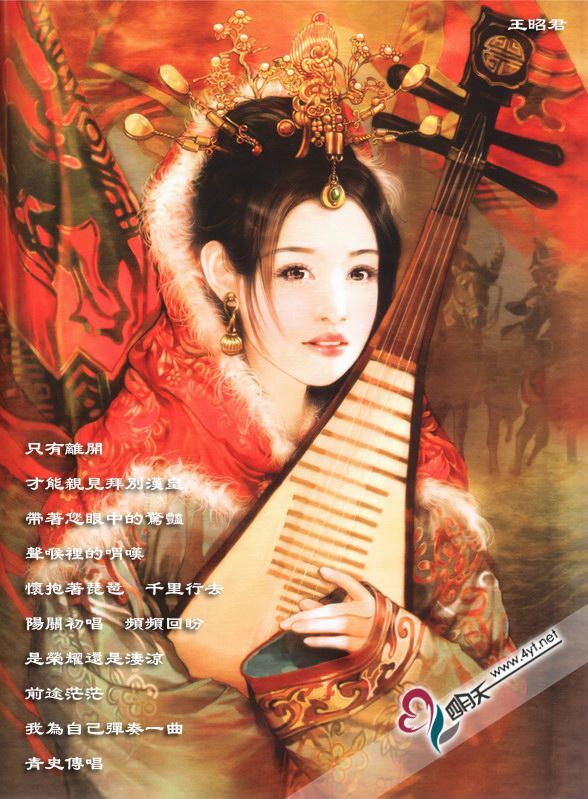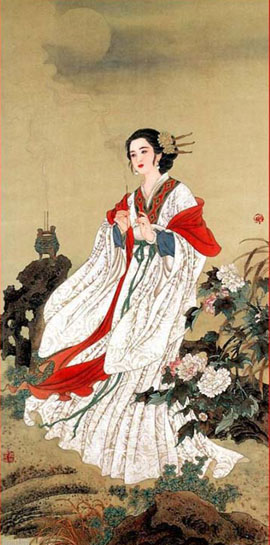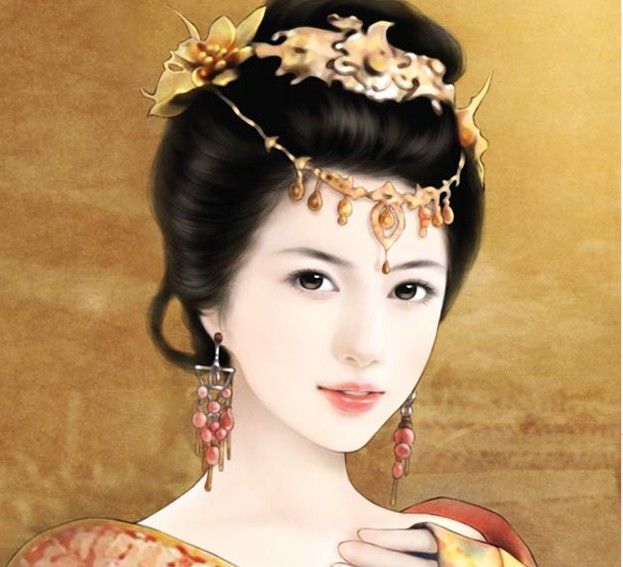Four Beauties in Chinese History
Xi Shi: Causing Fish to Sink
Xi Shi, who was born in Zhuluo Village, of Zhuji (now Zhuji City, Zhejiang Province), the capital of ancient Yue State during the Spring and Autumn Period (770-476 BC), has widely been considered the most beautiful of ancient China's "four beauties." It has been said Xi, while washing veil, caused the fish, which were frozen by her beauty, to sink to the bottom of the river.
Around that time, the State of Yue was defeated by the State of Wu, whose king was Fu Chai. Gou Jian, king of Yue, was imprisoned for three years, and Yue was annexed by Wu. To get his revenge, Gou took the advice of Wen Zhong, one of his ministers, and selected beautiful women to offer to Fu. Fan Li, another minister of Yue State, eventually offered Xi Shi and Zheng Dan, another beauty, to Fu.
Enchanted by the beauty of both Xi and Zheng, Fu paid less attention to state affairs, and he became less interested in what his ministers had to say. He even ordered the death of his top general, Wu Zixu, at the urging of the beautiful women. The power of Wu State weakened gradually, and Fu was eventually conquered by Yue's army. After the defeat, Fu committed suicide.
According to legend, Xi Shi then lived with Fan Li, who had quit his post after Fu's fall. Nobody saw Xi or Fan again.

Wang Zhaojun: Grounding the Geese
Wang Zhaojun, also called Wang Qiang, was born in Zigui County (now Xingshan County, Hubei Province), during the Western Han Dynasty (206 BC-24 AD). During the reign of Emperor Yuan (49-33 BC), Wang entered the court as one of the many candidates from whom the emperor would choose his concubines. She was not selected.
Wang, who was straightforward and honest, had refused to bribe the court's painter, Mao Yanshou, as the others had done. Mao painted portraits—used by the emperor to select the concubines—of the candidates. That prompted Mao to paint an unflattering portrait of Wang, and, as a result, the emperor overlooked her.
In 33 BC, Huhanye, the Khan of Huns, a nomadic people to the north, wanted to establish good relations with the Western Han Dynasty. Huhanye visited the capital, Chang'an (now Xi'an, Shaanxi Province), and requested a princess whom he could marry. Such gestures were often used to establish good relations in those days.
Instead, Emperor Yuan decided to offer Huhanye one of the would-be concubines. The emperor asked someone to volunteer, and he agreed she would be treated like a princess. Most of the candidates were not willing to leave their homeland and give up their comfortable lives in the palace. Only Wang, who was tired of her boring life, volunteered.
Before the couple had a chance to leave Chang'an, Emperor Yuan met Huhanye and Wang. The emperor was floored by Wang's beauty, and he regretted his decision. A short time later, the emperor discovered what had happened, and he ordered the painter's death.
According to legend, Wang felt sad while leaving her homeland. She played melancholic music on the qin, a stringed instrument, while riding a horse. A flock of geese, flying overhead, forgot how to fly—after seeing the beautiful, but distraught, woman playing the sad music—and plummeted to the ground.
Wang soon became one of Huhanye's favorites, and she gave birth to two sons. Unfortunately, only one baby survived. After Huhanye died, Wang adhered to Huns custom, and became the wife of the next Chanyu. During her second marriage, Wang gave birth to two daughters.
Thanks to Wang's selflessness, there was peace between the middle kingdom and Huns for more than 60 years.

Diao Chan: Forcing the Moon to Hide
Diao Chan is unlike the other beauties: She has never been mentioned in history books, and she might be a fictional figure. Her story is told in the famous historical novel Romance of the Three Kingdoms by Luo Guanzhong. Diao was a pretty singer during the Eastern Han Dynasty (25-220 AD), and she resided with the family of Wang Yun, who was an official.
One night, Diao was in the garden, praying to the full moon. Suddenly, a cloud floated by and blocked the moon's glow. Wang Yun witnessed the event, and he told others, "Diao Chan is more beautiful than the full moon. The moon felt shame and hid behind the cloud."
According to legend, Diao joined a plot, initiated by Wang, to persuade Lv Bu, the great warrior, to kill his godfather, the despotic Dong Zhuo, who planned to usurp the throne. Wang had Diao became involved with Lv, and later offered her to Dong as a concubine.
After learning Dong had taken Diao as a concubine, Lv became angry and killed Dong, at Wang Yun's urging. Later, Diao married Lv and they had children. Lv was eventually killed by Cao Cao1, and Diao was never heard of again.

Yang Guifei: Shame on the Flowers
Yang Guifei, whose name was Yang Yuhuan, was born into an official's family in Yongle (now Huayin County, Shaanxi Province) in 719 AD, which was during the Tang Dynasty (618-907 AD). In addition to her beauty, Yang was an accomplished singer and dancer. When she was 16, Yang married Prince Shou, who was Emperor Xuanzong's 18th son.
Attracted by her beauty, the emperor wanted to marry Yang. He forced her to divorce Prince Shou, and then made her convert to Taoism. He gave her the title of Taizhen, and she resided in Taizhen Palace. Later, Prince Shou married a general's daughter, and then Yang became the emperor's high-ranked imperial concubine. Benefiting from their association with Yang, many of her relatives became high-ranking officials—including her cousin, Yang Guozhong, who assumed the post of prime minister.
One day, as legend has it, Yang walked through the garden and, attracted by the beauty of the flowers, she touched one of the plants. That caused the flower's petals and leaves to curl. One of the maids witnessed the event, and she told everyone the flower had bowed its head in shame after having seen Yang's beautiful face. Yang had touched a mimosa flower.
During the Anshi Rebellion2, the emperor fled Chang'an for Chengdu. Along the way, the soldiers protecting the emperor stopped at Mawei post3 (now in Xinping, Shaanxi Province). They believed the primer minister Yang Guozhong, was responsible for the country's upheaval, and they demanded his death. Xuanzong had no option but to agree. The soldiers also demanded Yang Guifei be killed. At age 38, she hanged herself.

News&Opinion
 more
more- Four Beauties in Chinese History
- China's Air Force Aerobatics Team Performs at Ai...
- Chinese Education Ministry Forms Special Group t...
- The 4th Zhejiang Foreign Students Chinese Talent...
- Asian Games: China has done it again!
- Chinese supercomputer ranked fastest
- China's Wushu star Yuan wins first gold of Asian...
- Expo Shanghai "never ending", says People's Daily
Policy&Laws
China Makes Great Contributions to MDGs
Since global leaders established the Millennium Development Goals (M...
China, Singapore Swap "Young Business Ambassador...
9:16:44 September 14, 2010 Eight "young business ambassadors" fro...
Alibaba to Help U.S. Students in E-commerce Job ...
HANGZHOU, Sept. 11 (Xinhua) -- Alibaba Group, China's largest e-comm...





 print
print  email
email  Favorite
Favorite  Transtlate
Transtlate 







